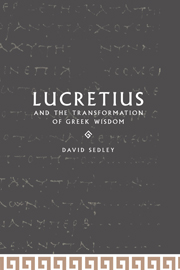Book contents
- Frontmatter
- Contents
- Preface
- Introduction
- Chapter 1 The Empedoclean opening
- Chapter 2 Two languages, two worlds
- Chapter 3 Lucretius the fundamentalist
- Chapter 4 Epicurus, On nature
- Chapter 5 Lucretius' plan and its execution
- Chapter 6 The imprint of Theophrastus
- Chapter 7 The transformation of book I
- Epilogue
- Bibliography
- Index locorum
- General index
- Index of modern scholars
Chapter 4 - Epicurus, On nature
Published online by Cambridge University Press: 22 September 2009
- Frontmatter
- Contents
- Preface
- Introduction
- Chapter 1 The Empedoclean opening
- Chapter 2 Two languages, two worlds
- Chapter 3 Lucretius the fundamentalist
- Chapter 4 Epicurus, On nature
- Chapter 5 Lucretius' plan and its execution
- Chapter 6 The imprint of Theophrastus
- Chapter 7 The transformation of book I
- Epilogue
- Bibliography
- Index locorum
- General index
- Index of modern scholars
Summary
THE DISCOVERY
The cataclysmic eruption of Vesuvius in ad 79 buried the town of Herculaneum in a torrent of boiling mud. Streams of lava from subsequent eruptions increased its depth to some hundred feet below the surface. Not surprisingly, the teams of excavators assigned to the site from 1709 onwards by the Bourbon rulers of Naples did not consider uncovering the buildings from above, but chose instead to plunder their contents by means of underground tunnels. The most spectacular discovery was made during the 1750s – a vast suburban villa containing an art collection of unrivalled magnicence. The excavation of the villa proceeded, room by room, over a period of many years. Towards the end of the second year, workmen excavating the tablinum began to happen upon black lumps which they mistook for charcoal. Many they threw away or took home to kindle their fires, and it was only when the fragments of one which had been dropped were seen to contain writing that they were recognised as rolls of papyrus.
The tablinum was a pleasant room looking out onto the garden on one side and onto a portico on the other, with a mosaic floor and, down the centre, a row of eight bronze busts. The papyrus scrolls were found strewn around the room, together with a few wax tablets.
- Type
- Chapter
- Information
- Lucretius and the Transformation of Greek Wisdom , pp. 94 - 133Publisher: Cambridge University PressPrint publication year: 1998



